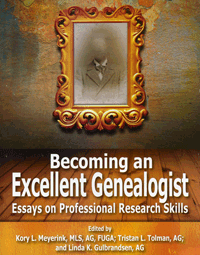 Genealogy is a hobby for many, a profession for others, and a passion for almost all practitioners. However, the one word that may be least used but best describes genealogy is science. Research science takes both skill and creative thinking. Genealogy is no different in this regard than any other science. And, like other scientists, genealogists, whether professionals or merely enthusiasts, are dedicated to finding answers through laborious, and sometimes difficult, research. Any research project is bound to encounter difficulties. Genealogists understand stumbling blocks all too well. Constant learning is the key to successful research and by-passing research dilemmas. Books, the Internet, magazines, conferences, and working with other genealogists are all avenues to expanded knowledge. Understanding the need to learn from the best resources, the International Commission for the Accreditation of Professional Genealogists (ICAPGen) has published Becoming An Excellent Genealogist: Essays On Professional Research Skills.
Genealogy is a hobby for many, a profession for others, and a passion for almost all practitioners. However, the one word that may be least used but best describes genealogy is science. Research science takes both skill and creative thinking. Genealogy is no different in this regard than any other science. And, like other scientists, genealogists, whether professionals or merely enthusiasts, are dedicated to finding answers through laborious, and sometimes difficult, research. Any research project is bound to encounter difficulties. Genealogists understand stumbling blocks all too well. Constant learning is the key to successful research and by-passing research dilemmas. Books, the Internet, magazines, conferences, and working with other genealogists are all avenues to expanded knowledge. Understanding the need to learn from the best resources, the International Commission for the Accreditation of Professional Genealogists (ICAPGen) has published Becoming An Excellent Genealogist: Essays On Professional Research Skills.
In referring to research issues, the Commission had this to say:
“… Every genealogical problem to be solved varies, to some degree, from every other problems.
Successfully navigating those difficulties is challenging, It takes a certain aptitude, as well as certain knowledge that may not be readily available…
The avocation of genealogy has grown. It is time to provide a higher level of instruction to more family historians in a convenient and inexpensive format. Yes, it takes time, effort, and (indeed) money to become an excellent (or advanced) genealogist.”
This is why the group has published Becoming an Excellent Genealogists. This collection of essay by experienced, professional genealogists “teaches concepts and methodology not usually taught in classes or other books.” This collection brings together generations of experience with the personal twist and examples of individual researchers. The essays are easy to understand, and explore research area both unique and critical to overall research success. Except for maybe the newest of beginners, this book has something to all levels of researcher. Even highly experienced professionals can benefit from another professionals experience and unique examples.
Consider this new 2012 guide a critical part of any researcher’s library. Inside the reader will find 25 helpful essays from 24 of the country’s top professional genealogists. The first essay asks, “What Makes an Excellent Genealogists?” Just pick up a copy and find the answers for yourself.
Contents
Acknowledgements, by Kory L. Meyerink
Contributors
Preface
Research foundations
1. What Makes an Excellent Genealogist?, by Kory L. Meyerink
2. Elements of Genealogy, by Kory L. Meyerink
Research Concepts and Methodologies
3. Genealogical Analysis, by Marilyn Markham
4. Avoiding the Assumption Trap, by Apryl cox
5. Demography as a Tool for Genealogists, by Karhryn Daynes
6. Migration Methodology, by Karen Clifford
7. Strategies for Tracing Female Lines, by Judith Eccles Wight
8. Casting the Net Wide: Searching Horizontal Kin and Neighbors, by Amy Harris
9. Researching Minorities in the United States, by Jimmy B. Parker
10. Big City Research, by James W. Petty
11. An Introduction to Medieval Research, by John Kitzmiller
12. Timelines: Essential to the Genealogist’s Toolbox, by Joy Price
13. Using DNA to Find Immigrant Origins, by Nathan W. Murphy
14. Child-Naming Patterns: A Tool to Assist with Family Reconstitution, by Richard Woodruff Price
Records and Information
15. Jurisdictions: Who Created the Record? by Loretta Evans
16. Getting the Most out of Electronic Indexes, by Suzanne Russo Adams
17. Effective use of Libraries, by Chad R. Milliner
Recording and Reporting
18. Documentation and Source Citation, by Amy Harris
19. Writing a Quality Research Report, by Linda K. Gulbrandsen
20. Good Writing: Essential to Becoming an Excellent Genealogist, by Tristan L. Tolman
21. Making Sure Your Work Survives You, by Anne Leptich
22. Paleography: Abstracting, Transcribing, Translating, by Ruth Ellen Maness and Heidi G. Sugden
Professional Work in Genealogy
23. A Brief History of the Accreditation Program, by Jill N. Crandell
24. When to Hire a Professional, by Tricia H. Petrey
25. ICAPGen Accreditation Process and Procedures, by Carolyn J. Nell
Becoming An Excellent Genealogist: Essays On Professional Research Skills, a new book from ICAPGen, is available from Family Roots Publishing; Price: $19.55